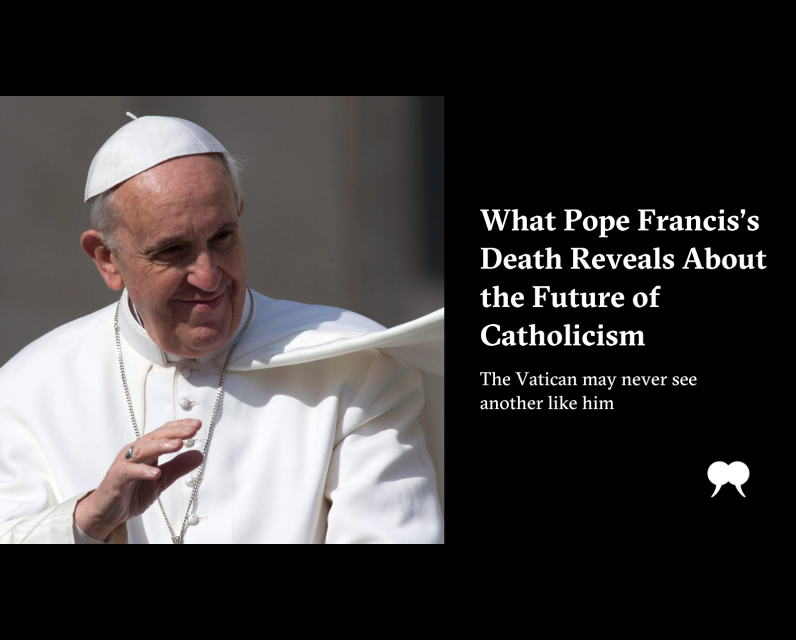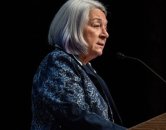Source Feed: Walrus
Author: Carmine Starnino
Publication Date: April 26, 2025 - 06:30
What Pope Francis’s Death Reveals About the Future of Catholicism
April 26, 2025

With Pope Francis’s death, the world reckons with the end of an era. The first Jesuit pope, the first from the Americas, and the first to take the name Francis, he brought an outsider’s voice to the Vatican—and a reformer’s instinct.
From his earliest days, he signalled a shift away from grandeur and toward humility, washing the feet of prisoners and warning against the “globalization of indifference.” He broke taboos, angered conservatives, and recast Catholic discourse to focus on mercy rather than dogma.
Now, the Church faces a moment of profound uncertainty. What happens to Francis’s legacy? And what kind of Church will emerge from this next conclave? Will it move forward, fall back, or break in a new direction entirely? I turned to Vatican specialist Michael W. Higgins, author of the acclaimed book on Pope Francis, The Jesuit Disruptor, to help make sense of his life, his contradictions, and the meaning of his passing.
What have we lost in Pope Francis? What made him unique?
Francis’s special gift for humanizing the office of the papacy establishes him as a reformer from the outset of his Petrine ministry. Style precedes but also underscores substance. Francis, the Argentine Jorge Mario Bergoglio, assured his “Franciscan” credentials when he identified the poor and the marginalized as the special object of his pastoral priorities. In addition, this savvy Jesuit knew that the Church, with its protocols, rules, and dogmatic certitudes, needed to do some radical rethinking of how it served the Gospel. For Francis, the Church is the “mystical body of Christ,” the “pilgrim people of God,” even the “societas perfectae” of the past, but mostly, primarily, it is a “field hospital.”
We will miss his common touch, his comfortable informality with the media, his fiery denunciation of the inadequacies and hypocrisies of his fellow clerics.
Can you go into some detail about what his “field hospital” metaphor was intended to mean?
Francis saw the Church as a centre for the wounded and the bruised, and not as a seat of judgment. He refused to weaponize the Eucharist or the other sacraments as if they were less conduits of grace and more sanctions to wield against the non-compliant. As he repeatedly said, “I am a sinner,” and this was not a pious nostrum or spasm of ardour but an expression of his deep conviction that he was flawed and in need of God’s mercy. As I said in The Jesuit Disruptor, “the field hospital is the place where the balm of mercy is applied to the wounded, where hope is generated, healing effected, spiritual equilibrium restored.”
How did a Pope who preached a “Church of mercy” and spoke so often about the poor leave the Church more divided than ever?
Francis was a bridge-builder, a pontifex, and succeeded in many ways in securing a new transparency and openness with other religions and the world at large. But many in the church he led did not share his call for free speech in ecclesial life, what is sometimes called parrhesia. They viewed, with alarm, his embracing of a faith defined in tension with doubt when they sought the consolations of inalterable dogma. They also felt that his softening of canonical sanctions diminished the Church’s historical integrity, whereas he saw the mitigation of the law as a sign of God’s infinite mercy. His detractors also deplored his critique of the techno-economic paradigm—the unfettered reign of free-market policies, for example—that ensured the hegemony of the West over the global South.
Both his theological and political sensibilities unsettled Catholics who felt comfortable in a church that knew its place and valued its state alliances.
I think about his famous statement about gay priests: “Who am I to judge?” Is there a sense, for you, that there were truths he told about the Church that previous popes didn’t dare?
Francis was not about to jettison the traditional biblical anthropology that undergirds Catholic teaching on sexuality and procreation, but he looked for common ground with gays, sought to understand their perspective, refused to dismiss them as threats to Catholic morality, and privileged real encounter and dialogue over church admonition and disapproval. As he repeatedly noted—using Blaise Pascal, among other sources—the personal takes priority over the abstract, as “reality is superior to ideas.”
Did Francis underestimate the resistance to change within his own Church?
In part, he did underestimate some dimensions of the resistance. For instance, he was depressed by the vitriol, disloyalty, and backbiting he found in many senior ecclesiastics whom he had relied on to advocate for the policies he was putting in place as the Successor of Peter. This was especially true of the significant pushback he received from the American prelates who were unsympathetic to his style and church objectives and were much more sympathetic with the two papacies that best defined their conventional and conservative views: Benedict XVI and John Paul II.
Can you speak a bit more about this pushback? What form did it take?
The American Catholic episcopacy, with rare exceptions, has always been more Roman than Rome, and Francis was not their idea of a Roman. They preferred John Paul II’s undiluted orthodoxy and Benedict’s monarchical manner to the non-doctrinaire and folksy Argentine. Francis’s approach smacked of disrespect for the office, and a bold and vocal minority of the Catholic laity—the majority of the laity, by the way, have remained pro-Francis—saw in the Latin American pope a dangerous leaning in the direction of orthopraxis (doing the right things) over orthodoxy (merely believing the right things).
As a consequence, various organizations, not a few aligned with the MAGA insurgency, have sought to right the balance in favour of traditional thinking. Media outlets like Eternal Word Television and wealthy business consortia have aligned in seeing in Francis, if not the Antichrist, most certainly a Bishop of Rome who has turned his face against tradition.
Did he achieve meaningful progress on any front? What lasting reforms can be directly traced to his leadership?
He did achieve some significant progress on several fronts. He promoted more women in the Vatican bureaucracy and in the Roman Curia than all his predecessors combined, and these were consequential promotions at the highest level, including the Governor of the Vatican City State. He created a welcoming climate for LGBTQ Catholics, moved constructively to address the legitimate complaints of Indigenous peoples in Canada, and introduced the concept and practice of synodality—a new way of living church life at every level. Admittedly, many of these initiatives were preliminary, and full implementation of his reforms awaits a successor in agreement with the Bergoglio priorities.
Does his failure to open the priesthood to women say more about the limits of his courage or the limits of the Church?
On the role and ministry of women in the Catholic Church, Francis has pushed the envelope further than any pope before him. He recognized that the issue of women in any kind of sacramental ministry was not going away. But he couldn’t see a way forward other than patiently waiting for the cultivation of a universal consensus for change around the exclusion of women from the diaconate or the presbyterate, and deploying a strategy of some redress by appointing women to the highest echelons of governance in the church in spite of their not being in orders.
Still, his failure to release the three studies (two of which he commissioned himself) on the history of women and the diaconate for the synod delegates gathered in Rome in the fall of 2024 showed a lack of nerve on his part. He did approve the final report of that synod, which included a passage stating that the issue of women in the diaconate was open to future discernment. He did not close the door, and that infuriated the conservatives in the church who saw that this stalling tactic would provide the opportunity for a future aperture to change.
Do you have any concerns that his reforms won’t be durable enough to survive the next conclave?
I think he has made serious inroads with large constituencies in the global Catholic Church that will ensure that many, if not all, of his reforms will move forward to full fruition. He created the vast majority of the College of Cardinals, has put some serious players in high positions as Metropolitan of large archdioceses, encouraged rectors of seminaries and theological institutes to make their formation programs more contemporary, and through his commitment to the principle of synodality has begun the process of creating a more participatory and relevant church.
But the greatest obstacle to the Bergoglian reforms lies in the twin scourges of the church: ecclesiastical careerism and clericalism. The latter, which includes the former, is the breeding ground for spiritual exceptionalism and misshapes the Catholic priesthood by turning it into a privileged caste rather than a body of humble ministers. Francis railed against the curse of clericalism throughout his entire pontificate, and the results on that front are depressingly mixed.
Who are you looking at as plausible candidates to replace him?
Any of the following Francis-friendly allies—thinkers and doers with established credibility—would be welcome: Michael Czerny of Canada, Jean-Claude Hollerich of Luxembourg, Mario Grech of Malta, Joseph Tobin of the United States, Matteo Zuppi of Italy, and Luis Tagle of the Philippines. If the cardinal electors opt for safer traditionalist hands at the helm of Peter’s Barque, then Peter Erdo of Hungary or Pietro Parolin of Italy are likely contenders or papabile to be taken seriously.
Based on this assessment—Francis-friendly or traditionalist—what do you think are two possible futures for the Church?
If the cardinal electors choose a traditionalist, they will seal the church’s future in a tomb of nostalgia and irrelevance. If they select a reformer in the Francis mold, they will continue the shift from a conventional model—the generic pyramid of leadership—to Francis’s preferred model, the inverted pyramid, where leadership is no longer at the apex. Francis envisioned a church structure that empowered laypeople. He saw the laity as companions on the way rather than as a flock to be governed.
One of the titles of the pope, in addition to the usual collection of honorifics like Bishop of Rome, Vicar of Christ, Supreme Pontiff, Head of the Vatican City State, and Successor of Peter, is Servant of the servants of God. That held huge appeal for Francis. It spoke not only to his natural humility but also to his conviction that the priesthood is not about power but service.The post What Pope Francis’s Death Reveals About the Future of Catholicism first appeared on The Walrus.
Gov. Gen. says the pontiff's apology for widespread abuses in the residential school system was a significant step in addressing historical injustices
April 26, 2025 - 13:21 | Globalnews Digital | Global News - Canada
NDP Leader Jagmeet Singh says he considered stepping down after being told about a credible threat to his life in December, 2023.Singh says the RCMP warned him about the threat and put him and his family under heavy police protection in late 2023 and early 2024.
April 26, 2025 - 12:49 | David Baxter | The Globe and Mail
It was unexpected and the reason can’t be shared yet. Just days after a jury began hearing the sexual assault case against five hockey players in a London, Ont., courthouse, the judge ordered a mistrial. The players have pleaded not guilty.The proceedings restarted immediately on Friday with the selection of a new jury. To help understand the legal concepts, here are the insights of two veteran criminal lawyers and a former Crown attorney.
April 26, 2025 - 11:11 | Ha Tu Thanh | The Globe and Mail


Comments
Be the first to comment